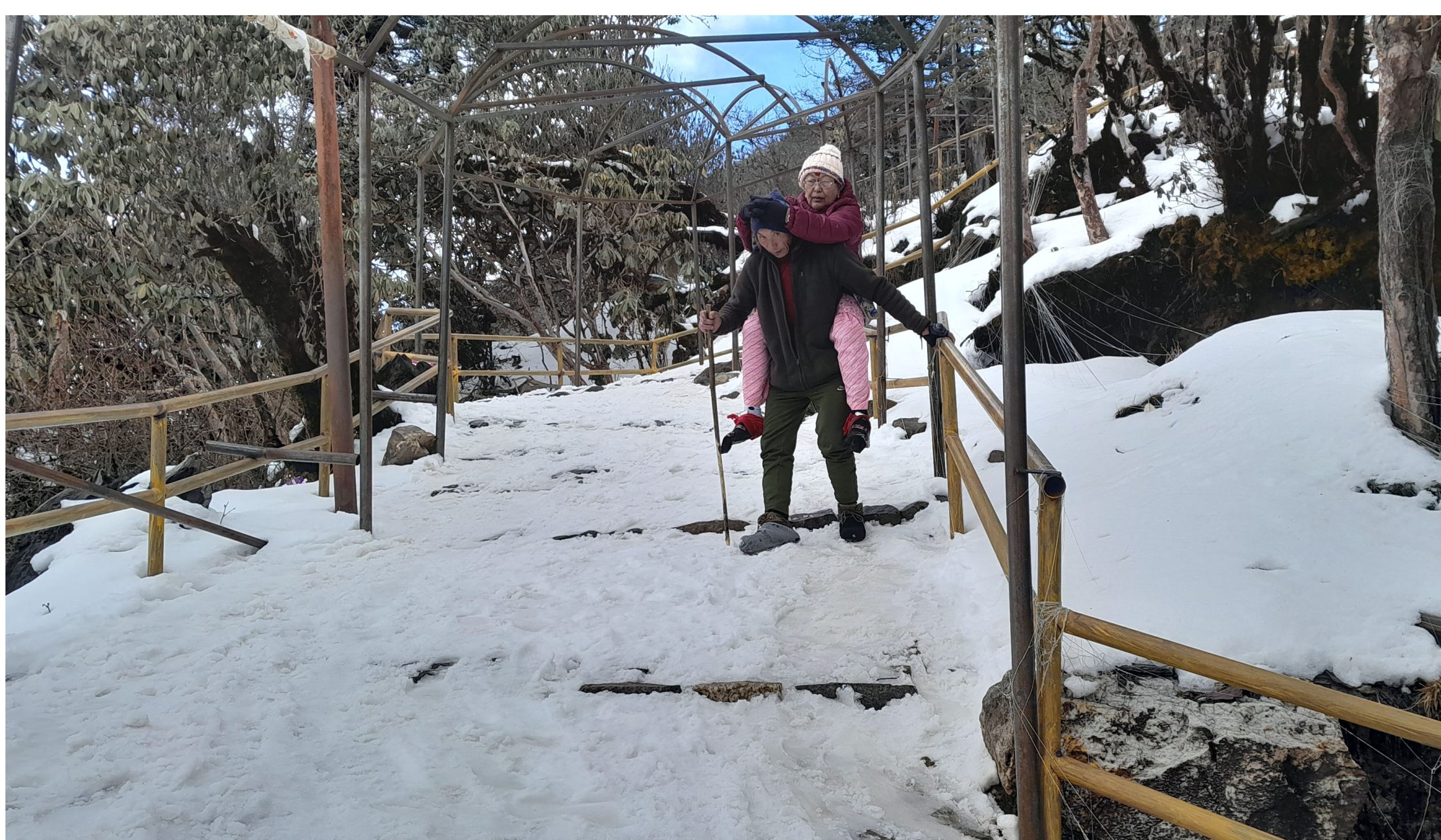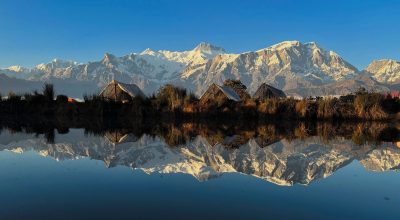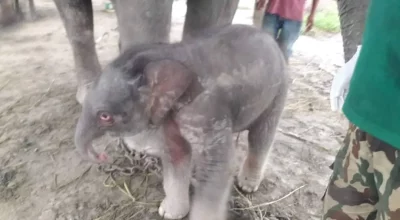
Dil Kumar Limbu
Taplejung, April 22: Reaching the Pathibhara Devi Temple in Taplejung, one of the holy shrines of the country, through a hardship-filled journey relieves the pilgrims and tourists. Pilgrims and devotees have a belief that one’s wishes get fulfilled by worshiping at the temple.
The temple located at an elevation of 3,794 metres, is reached after around two hour’s drive from Phungling bazaar to Kafle Pati and around four hour’s walk from Kafle Pati through Tinjure, Chauki and Mangalbare, Lampokhari, and Gufa Pokhari.
The journey to the holy place becomes much excited and fun-filled with the rhododendron blooming along the way. Tinjure-Milke-Jaljale (TMJ) area is known as the capital of rhododendron flower. The beautiful sceneries are one of the major attractions for tourists. The official national flower of Nepal generally blooms in the spring season (March-May). The flowers bloom to the fullest during the Nepali months of Chaitra and Baisakh (March-April).
However, to the surprise and worry of concerned authorities and local people, the flowers did not bloom this year, thanks to many factors being climate change as a major one, said researchers.
Phul Maya Limbu of Sidingwa Rural Municipality-4 had planned to visit the temple for worship. Her excitement about the journey was fuelled by rhododendron blooming along the way. As per her plan, she set out for the journey on Wednesday. She had a plan to enjoy along the way lined with rhododendron flowers blooming, and taking pictures with the flowers. But, to get her plan being shattered, she did not get rhododendron flowers bloom this year. Why the flower did not bloom this year? she wondered.
The flowers do not grow in Madhes. “So I had hoped to enjoy with the flowers coinciding with my visit to the temple,” she said.
Shiva Yadav from Saptari district had also expected to see the flowers bloom this year while on the way to the temple.
In the previous years, a large number of prilgrims visited the temple being lured by the flowers blooming, said Manmani Kafle, executive director of the Pathibhara Area Development Committee. Out of 32 species of the flower found in Nepal, Pathibhara area is home to 26, said the Committee. Besides rare Red Panda, other animals including black bears, deer, himalayan thars and birds including Spiny Babbler, Lophura leucomelanos, and the country’s national bird, lophophorus are found in the area.
Pathibhara is located in Koshi Province. The province is home to over 30 species of the flower that come in different colours including red, pink, yellow, maroon and light white. Different species of the flower found in the area include ‘Sunpati’, ‘Rato Chimal’, ‘Chiyaphule’, ‘Green Chimal’, ‘Yellow Chimal’, ‘Junge Chimal’, ‘Sano Chimal’, ‘Lahare Chimal’, ‘Korling’, ‘Chimal’, and ‘Theki Jhar’.
The flowers are found in Taplejung, Terhathum, Sankhuwasabha and Ilam districts in the province at an altitude between 1,200 and 3,600 metres. Nepal is home to 33 species of the flower, and 31 of them are found in the province alone, experts claimed. They also bloom in Kaski, Myagdi, and Baglung districts in the west and Dadeldhura in the far-west.
The flower needs a temperature of 15-20 degree Celsius to bloom, which is the average temperature in the months of March and April in the middle and higher areas of the Himalayas, said experts.
Besides its beauty, the flower is used for various purposes like offering to god and goddess, and making medicinal herbs, pickle and alcohol.
It has been attracting not only the nature lovers, but also religious followers and researchers. It has also attracted the attention of the Ayurveda industries. Ayurveda industries have been making medicinal herbs through the flowers.
Climate change is blamed for the flowers not blooming this year, said Dipendra Pokharel, warden of the Kanchenjunga Conservation Area. Unlike in the past, substantial rainfall did not take place between mid-September, 2022 and third weeks of April, 2023. Snow also did not fall in the mountainous areas. As a result, mountains have turned into black rocks, and snow is rapidly melting, he said.
A lack of rainfall and snowfall has had its impact on the biological diversity, he said.
Botanist Bijaya Panta, who teaches at the Central Department of Botany, the Tribhuvan University, blamed lowering water level under the soil for the flowers not blooming this year. “Dryness has affected the flowers. They need water to bloom. But, substantial rainfall did not occur this year,” she said.
Microorganism and fungi halt the process of making the soil fertile and moist without water. So, the flower’s buds cannot bloom, she said. There are other many factors like climate change for this, she added.
Being concerned about the depletion of rhododendron forests in the area, local people and the concerned authorities have rolled up their sleeves to conserve them. The forests spanning 8,874 hectares of land in the TMJ have been depleting due to infrastructural construction, unchecked use of forest products and overgrazing, said local people. The TMJ area was declared a rhododendron conservation area in 1998. According to the Department of Forests and Soil Conservation, the flowers spread across 691,596 hectares of forestland across the country.
The Department had prepared an action plan for the conservation of rhododendron species, according to government officials. Under the plan, the flower habitat will be identified, pastures managed and flower saplings planted in forests in five years.
Officials at the Division Forest Office in Terhathum district said the Office had launched various programmes to create awareness about the conservation of the flowers and the forests.
Efforts to conserve the flowers are underway with financial assistances from the Ministry of Culture, Tourism and Civil Aviation, said the authorities concerned. [Translated by Pritam Bhattarai] (RSS)
















